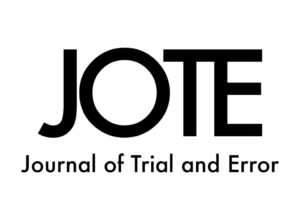JOTE ~ The Journal Of Trial And Error
 The Journal of Trial and Error aims to close the gap between what is researched and what is published. In scientific practice, trial and error is a fundamental process of learning and discovery. Therefore, we want to make public the lessons of the struggles in research. We are convinced about the productive role of errors, and so we aim to publish answers to the question “what went wrong?”, as well as problematising this question by reflecting on what failure means in science. You can read our manifesto to learn further about our goals, and the benefits of publishing errors.
The Journal of Trial and Error aims to close the gap between what is researched and what is published. In scientific practice, trial and error is a fundamental process of learning and discovery. Therefore, we want to make public the lessons of the struggles in research. We are convinced about the productive role of errors, and so we aim to publish answers to the question “what went wrong?”, as well as problematising this question by reflecting on what failure means in science. You can read our manifesto to learn further about our goals, and the benefits of publishing errors.
From the Manifesto
We state that …
Trial and Error is the elementary process in Science by which knowledge is acquired. We differentiate between two types of scientific Trial and Error processes:
– Methodological errors in a practical sense, driving improvement in the understanding and application of techniques. These errors are here understood in a broad sense, those that go beyond the learning of the individual researcher and have an impact at the scale of the scientific community.-
Conceptual flaws, arising from hypothesis being confronted with conflicting observations. When the initial hypotheses are inappropriate in the face of empirical evidence, scientists improve or reject theoretical frameworks by developing alternative theses aimed at increasing empirical adequacy. Not only hits (positive results), but also misses (negative results) are key to scientific progress.
We identify three core problems in today’s Science. Namely, …
… a public image of Science based on breakthrough discoveries, fascinating images, and clear results. This reputation comes at a cost. Both scientists themselves, as well as philosophers, sociologists and historians of science have increasingly been highlighting the importance of science in the making. A more faithful picture of Science, the one of practices and fine-tuning methodologies, seems to be at odds with the unrealistic public image of big-discovery Science.
… a gap between what is published and what is researched. We know positive publication bias pressures scientists to conceal methodological mistakes and discard research containing negative findings, threatening proper interpretation. In the face of failed research —outcomes of Science that do not meet the initial aim of the individual researchers— scientists have two options at hand: not publishing or framing the results as productive by, for example, adding ad-hoc hypotheses in a potentially inadequate manner. This point is a consequence of the expectations of big-discovery Science and the publish-or-perish politics of this Science.
… a replication crisis. Since scientists validate their results in terms of replicability, the present-day situation of unreplicable experiments is a serious problem. Debate on this replication crisis has focused on the misuse of statistics by scientists, on methodological carelessness, or theoretical inappropriateness. Only a few venues are attentive to the potential harm.
[…] The complete Manifesto: https://www.jtrialerror.com/the-manifesto-for-trial-and-error-in-science/
URL Journal: https://www.jtrialerror.com/